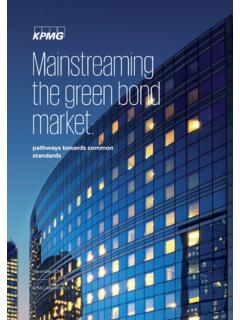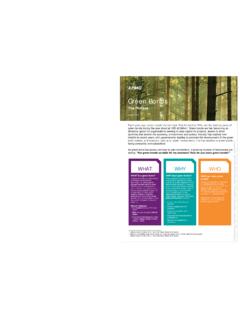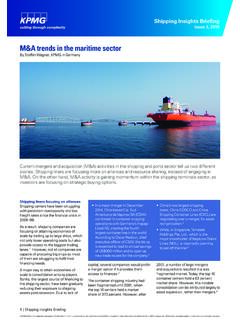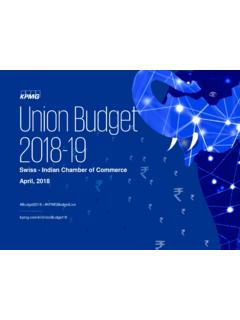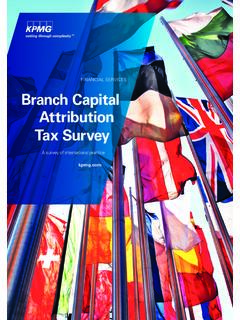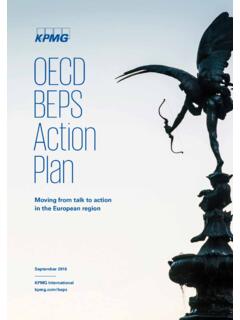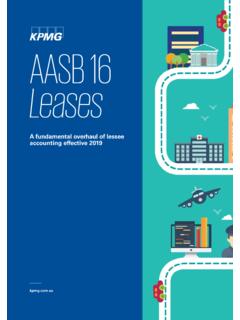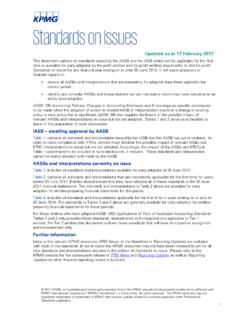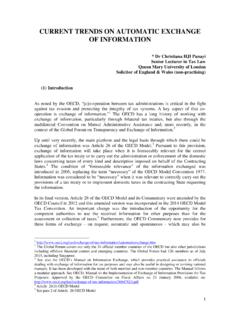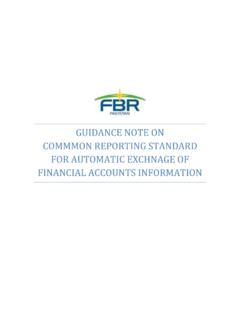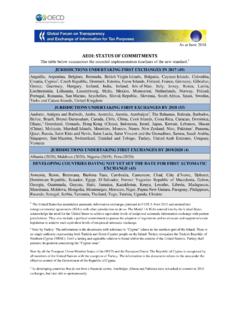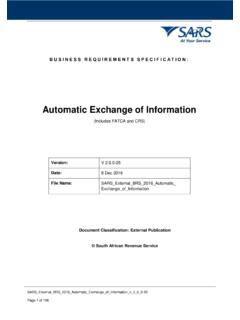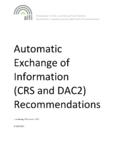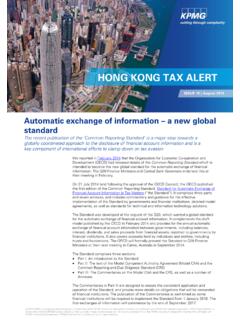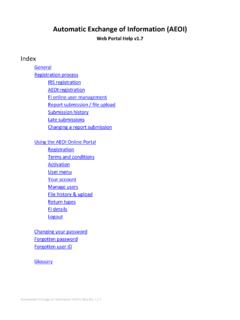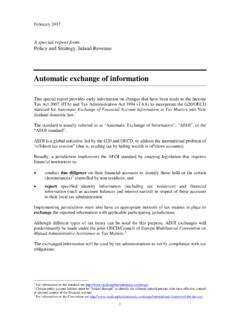Transcription of Automatic Exchange of Information The Common Reporting ...
1 Automatic Exchange of Information The Common Reporting Standard What is CRS?What is exchanged?CRS implementation commitmentThe CRS impacts a similar range of financial institutions (FIs) as FATCA, comprising: Depository institutions Custodial institutions Investment entities Specifiedinsurance companiesHong Kong will adopt a pragmatic approach to include all essential requirements of the Automatic Exchange of Information (AEOI) standard in its domestic law penaltiesapply to FIs, employees of FIs and third-party service providers for accounts held by tax residents in CRS participating countries are reportable, including: Individuals Entities including trusts and foundations, and the requirement to look through passive entities Reporting on controlling is affected?The CommonReporting Standard (CRS)was developed by the Organisation for Economic Co-operation and Development (OECD) to provide systematic and periodic Exchange of tax residents financial account Information between participating jurisdictions.
2 This globalstandard is built upon Information sharing legislation such as the US Foreign Account Tax Compliance Act(FATCA)and EU Savings Directive as a measure to improve tax transparency and counter tax the CRS, jurisdictions obtain Information from their financial institutions and Exchange that Information with other jurisdictions on an annual basis. In brief, the CRS sets out:1)Which financial institutions need to report2)The types of accounts and taxpayers covered 3)Due diligence procedures4)Financial account Information to be at 14 April 2016, 98 jurisdictions had committed to the CRS. Over 50 jurisdictions are early adopters, with a CRS implementation date of 1 January undertaking first Information exchanges by 2017 (Early adopters)Jurisdictions undertaking first Information exchanges by 2018 (Late adopters) Anguilla Argentina Barbados Belgium Bermuda British Virgin Islands Bulgaria Cayman Islands Colombia Croatia Cura ao Cyprus Czech Republic Denmark Dominica Estonia Faroe Islands Finland France Germany Gibraltar Greece Greenland Guernsey Hungary Iceland India Ireland Isle of Man Italy Jersey Korea Latvia Liechtenstein Lithuania Luxembourg Malta Mexico Montserrat Netherlands Niue Norway Poland Portugal Romania San Marino Seychelles Slovak Republic Slovenia South Africa Spain Sweden Trinidad and Tobago Turks and Caicos Islands United Kingdom Albania Andorra Antigua and Barbuda Aruba Australia Austria The Bahamas Belize Brazil Brunei Darussalam Canada Chile China Cook Islands Costa Rica Ghana Grenada Hong Kong Indonesia Israel Japan Kuwait Macau Malaysia Marshall Islands Mauritius Monaco Nauru New Zealand Qatar Russia Saint Kitts and Nevis Samoa Saint Lucia Saint Vincent and the Grenadines Saudi Arabia Singapore SintMaarten Switzerland Turkey United Arab
3 Emirates Uruguay Vanuatu 2016 KPMG Advisory (Hong Kong) Limited, a Hong Kong limited liability company and a member firm of the KPMG network of independent member firms affiliated with KPMG International Cooperative ("KPMG International"), a Swiss entity. All rights reserved. Printed in Hong Kong. The KPMG name and logo are registered trademarks or trademarks of KPMG HauDirector, Risk ConsultingT: +852 2685 7780E: KinsleyPrincipal, TaxT: +852 2826 8070E: Information contained herein is of a general nature and is not intended to address the circumstances of any particular individual or entity. Although we endeavour to provide accurate and timely Information , there can be no guarantee that such Information is accurate as of the date it is received or that it will continue to be accurate in the future. No one should act on such Information without appropriate professional advice after a thorough examination of the particular situation. 2016 KPMG Advisory (Hong Kong) Limited, a Hong Kong limited liability company and a member firm of the KPMG network of independent member firms affiliated with KPMG International Cooperative ("KPMG International"), a Swiss entity.
4 All rights reserved. Printed in Hong Kong. The KPMG name and logo are registered trademarks or trademarks of KPMG CRS is more than just an enhanced version of FATCAThe scope of CRS is much wider than FATCA: No de minimisaccount balance thresholds for reviewing individual account holders under the CRS Expansion of financial institutions subject to the CRS Search for non-resident account holders from possibly 90+ strategy for avoiding reportable persons under FATCA is not likely possible under you readyfor the CRS? Where are you currently in your CRS compliance effort? How challenging has the preparation for the CRS regime been for your organisation? Are you confident that your organisation will achieve CRS compliance by the deadlines,especially if you have operations in early adopting jurisdictions? Do you know what the majority of affected organisations in your industry are doing to address the CRS requirements?Impact of the CRS201720162018 Early adopters*( Cayman Islands)Late adopters ( Hong Kong#)1 Jan 2016 Apply new account opening procedures31 Dec 2016 Complete due diligence for pre-existing high-value individual accountsBCDECBDFAEAAre you ready for CRS?
5 Please contact us to discuss how we can help:Proposed CRS timeline31 May 2017 First CRS Reporting date deadline to the Tax Information Authority 31 Dec 2017 Complete due diligence for all remaining pre-existing accounts31 Dec 2018 All Information on reportable accounts will be available for Exchange , including the low-value individual pre-existing accounts and entity accounts1 Jan 2017 Apply new account opening proceduresSep 2017 Register withthe Inland Revenue Department (IRD)*CRS milestones for early adopter countries are one year earlier than late adopters#Target enactment date of CRS legislation in Hong Kong middle of 2016Q4 2017 Submit test data files of self-developed Reporting software to IRD for validation31 Dec 2017 Complete due diligence for pre-existing high-value individual accountsJan 2018 IRD issues AEOI returns to registered Hong Kong FIsMay 2018 File AEOI returns to the IRD31 Dec 2018 Complete due diligence for all remaining pre-existing accountsEnd 2018 IRD s first Exchange of Information with AEOI partnersAEOI compliance is not optional The CRS multiplies the number of account holders and investors that must be identified and reported.
6 Asset managers and insurance companies are the most and comprehensive planning will be required to properly allocate resourcesFIs should take into account the statutory timeline with its phasedin impact -systems & culture FIs need to keep abreast of new global regulations, manage relationships with multiple tax authorities, and educate staff and clients on account opening procedures and Reporting requirements. CRS compliance will increase costs and negatively impact marginsCRS compliance requires internal resources and external cost. An efficient compliance plan is necessary to minimise drains on compliance will not be business as usual The CRS impacts processes such as customer onboarding, pre-existing customer due diligence, Reporting and systems and databases may also require modification. Collecting complex and varied Information The CRS impacts Information gathering from investors and account holders. FIs will need to collect account holder status and tax residency, which will differ from impactsKPMG s Hong Kong office was awarded FATCA Firm of the Yearby Finance Monthly

